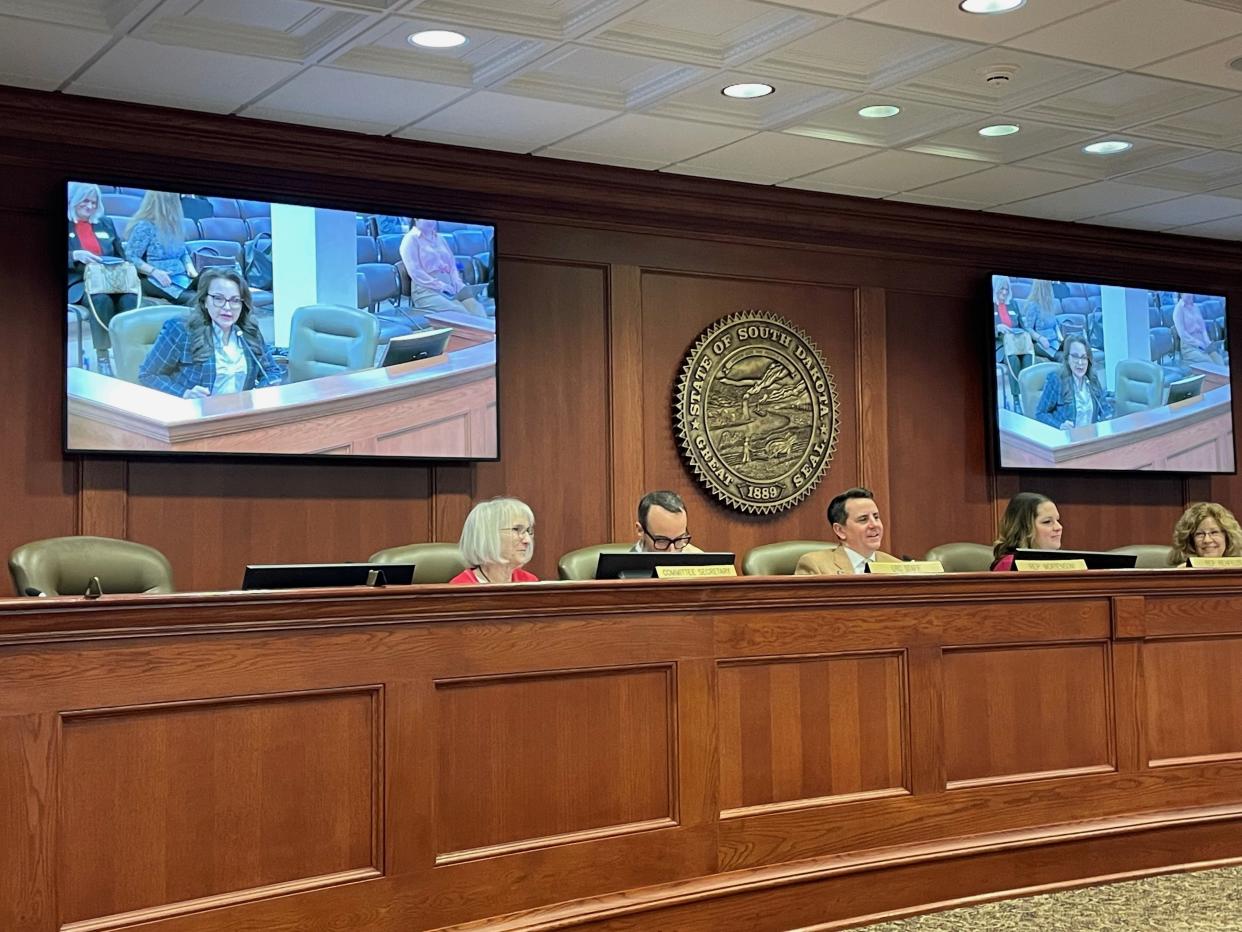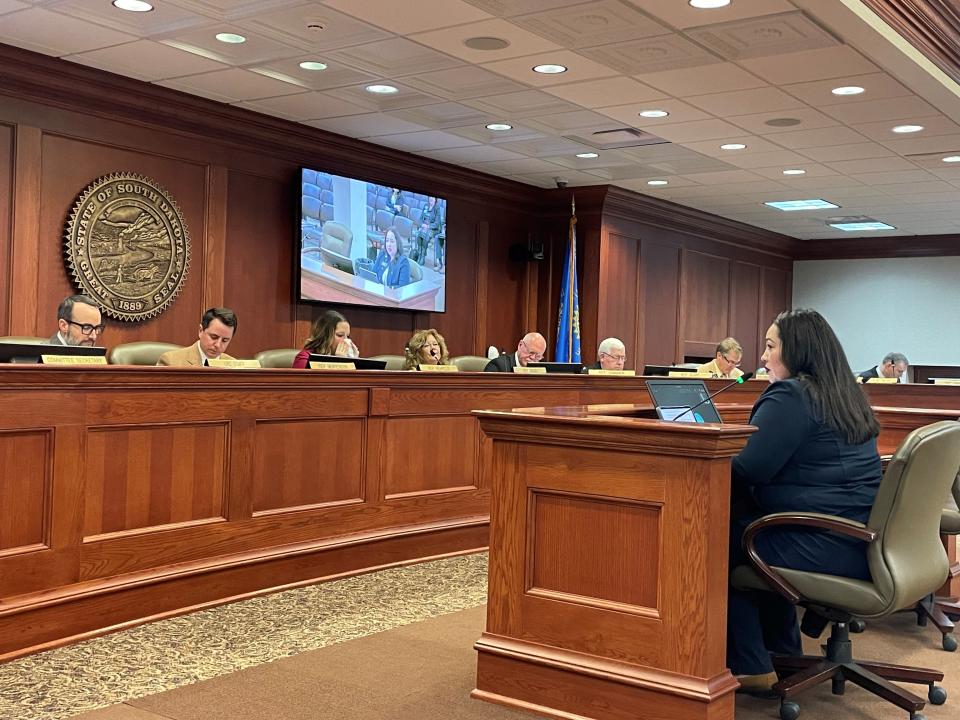South Dakota could soon have a new Indian Child Advisory Council, despite DSS opposition

- Oops!Something went wrong.Please try again later.
PIERRE — Lawmakers on a House committee approved a bill Wednesday to establish an advisory council to oversee communication on the welfare of Native American children in South Dakota’s foster care system. But the same committee also voted to reject a bill that would have created a two-year task force to study the welfare of Native children in foster care.
Rep. Tamara St. John, R-Sisseton, sponsored the advisory council bill, describing it as a way for stakeholders from tribes, the Department of Social Services and the South Dakota Legislature to come together once a year to hold a formalized discussion about the care of Native foster children.
“Where do we have that space for innovation, that focus on prevention, or how do we know what we're looking at in the form of data?” said St. John, an enrolled member of the Sisseton Wahpeton tribe.
More: The Lost Children: An Argus Leader/South Dakota Searchlight investigation into ICWA in SD
A six-month joint investigation by South Dakota Searchlight and the Argus Leader following last year’s legislative session explored the causes, effects and potential solutions to the decades-long overrepresentation of Native American children in South Dakota’s foster care system. Native American children accounted for nearly 74% of the foster care system in June 2023, despite accounting for only 13% of the state’s overall child population.
Rep. Peri Pourier, D-Rapid City, sponsored the failed bill to create a 21-member task force to study the problem and expand portions of the federal Indian Child Welfare Act into state law, which was part of the task force’s duties. Pourier, a member of the Oglala Sioux Tribe, and St. John brought their bills as a way to further the conversation around children in state care.

St. John’s council bill originally had the group meeting four times a year, but she brought an amendment reducing the frequency to once a year. At the end of that annual meeting, minutes would be available for lawmakers to refer back to if they want to bring future legislation.
Jessica Morson, the ICWA Coalition director, also spoke in favor of HB 1232, saying that it served as a “step forward” and “enhances focus on solutions-based collaboration in a smaller, more effective setting by review of existing practices and laws.”
The only opposition came from Department of Social Services Secretary Matt Althoff, who said that the department already has the ability to hold the conversations now in a less formal environment.
He said despite wonderful intentions, it’s unlikely the advisory council “is going to achieve much given the totality of what it faces.”
More: Native American child welfare bills return to legislature after federal ICWA upheld
The department also opposed Pourier’s task force bill, saying it’s already working individually with tribes on how to better support Native children in care and foster families across the state.
Althoff added that the task force, modeled after a 2006 task force that studied the same issue, may not be successful because of various competing interests.
“Please understand that the work continues regardless of the bill, so you have our assurances that we will not relent and are wanting to continue to keep these lines of communications and these intersects between tribal officials and ourselves ongoing,” he said.
Lawmakers voiced concerns about the size of the task force and recommended a summer study as a possible avenue for future conversation. The committee voted 10-1 to reject the bill with the lone dissenting voice coming from Rep. Erin Healy, D-Sioux Falls.
But, lawmakers liked the idea of St. John’s formalized council. Rep. Taylor Rehfeldt, R-Sioux Falls, said it would serve as a baseline to gather data.
“If we're in the same spot as we were the year before, then that tells us that we're probably not doing something right," she said. "So even if we can just do that one small thing of establishing that something else needs to happen, that we're clearly not making steps in the right direction, I think that alone is worth having something."
More: Tackling substance abuse with families in mind to prevent foster care placements
Rep. Will Mortenson, R-Fort Pierre, noted that while the council won’t stop children from entering into the foster care system, it wouldn’t be an undue burden on the department, an argument that had been voiced by Rep. Rocky Blaire, R-Ideal, when he spoke in opposition to the bill.
Mortenson noted that everyone would have to address one of the leading reasons why children are removed from their parents in the first place: alcohol and drug abuse. Parental substance abuse is 57% of the reason why South Dakota children are removed from their families and placed into foster care, according to federal data.
“I think that we're doing a disservice to this topic if we don't acknowledge phase one of this problem and try to train our collective focus there,” he said.
The advisory council bill passed 10-2 to the House floor, where it’ll be debated next.
This article originally appeared on Sioux Falls Argus Leader: South Dakota could soon have a new Indian Child Advisory Council

